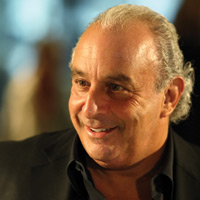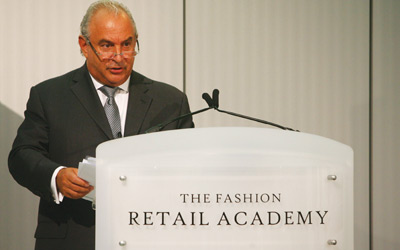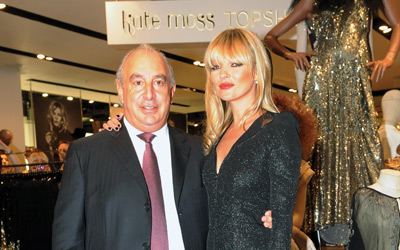 Sir Philip Green has built up a retail empire from scratch, so we take a look at how this South London schoolboy has become an internationally recognised entrepreneur.
Sir Philip Green has built up a retail empire from scratch, so we take a look at how this South London schoolboy has become an internationally recognised entrepreneur.
As the owner of the Arcadia Group (home of Topshop, Dorothy Perkins and Miss Selfridge) Sir Philip Green’s sheer dedication and ambition with regards to retail cannot be overlooked. With a fortune of £4.2 billion and a conglomerate of renowned High Street retailers, Green is an outstanding example of British entrepreneurship. In 2006, he received an accolade that confirmed his industrial dedication, being knighted for services to the retail industry.
Born in 1952 in Croydon, South London, Philip Green initiated his business success at a very young age. Following the death of his father, when Green was only twelve years old, he was left in line to inherit the family business. He found himself inspired by the abilities of his parents – who ran petrol stations and launderettes – and left the boarding school that he attended in Oxfordshire aged 15, beginning work at 16. This involved all aspects of shoe retailing, from importing to selling, and Green realised that to progress in business, you must “teach yourself about how things are done. See how other people are doing them.” Green found that his pragmatic approach to life was unsuited to the education environment, instead preferring the adult world of business in which he could use his practical skills. Necessity and ambition then continued to drive opportunity and at 23, he established his first fashion business, which involved the procurement of jeans from Hong Kong. Although he admits that to some extent he was involved with the ‘sweat-shops’ of the region during his start-up period, Green deemed it essential in obtaining his products and simultaneously a benefit to those that wished to work. Even at an early stage in his career, it was visible that Sir Philip was business-savvy.
From 1979 onwards, Sir Philip gradually built up his business empire through the continual purchase of companies that appeared to be failing and had sizeable debts and surplus stock they were unable to sell on. Obtaining these dwindling companies meant that Green learnt very quickly and rationally how to turn them around and make himself a commendable profit, a risk-taking process that would become invaluable to him in later procurements.

Following an abandoned hostile bid for High Street retailer Marks & Spencer in 1999, Green purchased failing retail store chain Bhs in 2000 for £200 million and succeeded in turning it around – but was not willing to do so at the expense of his workers. He said: “I could have closed down bits of British Home Stores to make more money but it’s not my style. I want to make my money as a retailer, not by putting people out of work.”
In 2002, Arcadia Group was purchased by Taveta Investments, part of Taveta Limited which is in itself is owned by Green’s family. Tina (Cristina) Green, the retailer’s wife and mother of his two children, is the only director of the latter company and has been consequently named the richest woman in the UK.
In the same year, Green was reported to have made a 202 per cent increase in profits for the company. Subsequent to this success, Green returned to Marks & Spencer in an attempt to add to his business success with the addition of the company in 2004. He however, was rivaled in the take-over bid for the Group by Stuart Rose, former Chief Executive at the Arcadia Group.
Despite great and ongoing success, he has not been able entirely to eradicate the difficulties that Bhs has suffered. In 2010, he was forced to close down ten of the chain’s stores in a deal with Primark. This followed Green’s decision to merge Bhs with the Arcadia Group, which enabled him to consolidate his businesses and consequently cut expenditure (a process that he has similarly proposed to the British government). This move has also involved the addition of Dorothy Perkins, Evans and Wallis brands into Bhs in order to encourage performance within them. By simultaneously closing down Arcadia stores whose leases are coming to an end, Green has aimed to cut rental costs and a resulting profit increase for Bhs. This adoption of a shared service model in his businesses, and his advisory report to the government, demonstrates his belief in the ability to increase the efficiency of companies by centralising services.

In 2007, he then went on to team up with supermodel Kate Moss, to launch her own clothing collection, which proved a great success for both Topshop and Moss, Green having said of the partnership: “We have been good for her and she has been good for us”. Two years later, Green expanded Topshop into America, with Kate Moss joining him at the launch in New York. It has been announced that the expansion is set to reach Australia, with the Arcadia Owner hoping to open a store in central Sydney.
In August 2010, Green was asked to lead a review of government spending of the previous three years. Although the collaboration was greatly criticised by the GMB Union, due to his wife’s residency in Monaco, meaning she does not pay UK income tax on dividends received from the Arcadia Group, his involvement has been proving a great success. The Topshop owner has offered invaluable expertise in the areas of product procurement as well as cost cutting to the government to make substantial savings across several sectors.
Philip Green importantly demonstrates that compromise, flexibility and daring are vital to succeed in business. Green’s success is based upon his strong knowledge of the products he retails and his risk-taking initiative that combine to exhibit true entrepreneurial spirit. He states “My philosophy has been: I stick to what I know” and it is this tenacity and understanding of his businesses that has permitted him to build his retail empire.
This article was first published in Careers with Hayley Taylor in August 2011. [Read the digital edition here]
Image: PA Photos


